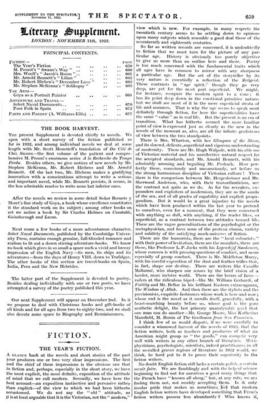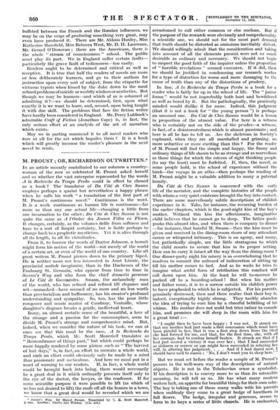FICTION.
THE YEAR'S FICTION.
A GLANCE back at the novels and short stories of the past year produces one or two very clear impressions. The first and the chief of these impressions is the obvious one that in fiction and, perhaps, especially in the short story, we have the most explicit, the most definite, exposition of the attitude of mind that we call modern. Secondly, we have here the best account—,an exposition instinctive and pervasive rather than explicit—of the view to which we had been hitherto accustomed. We do not say the " old " attitude, as it is at least arguable that it is the Victorian, not the" modern,"
view which is new. For example, in many respects the twentieth century seems to be settling down to opinions upon many subjects which resemble a good deal those of the seventeenth and eighteenth centuries.
So far as written records are concerned, it is undoubtedly to fiction that we must turn for the picture of any par- ticular age. History is obviously too purely objective to give us more than an outline here and there. Poetry is too much concerned with the fundamental traits which all ages have in common to mirror with any sharpness a particular age. But the art of the storyteller by its very nature is essentially a reflection of the Zeitgeist. These contrasts in " age spirit," though they go very deep, are yet for the most part superficial. We might, for instance, compare the modern spirit to a cone ; it has its point deep down in the emotional primitive nature, but we shall see most of it in the more superficial strata of life and manners. That is why the -age seems to speak most definitely through fiction, for here the superficialities have the same "value" as in real life. But the present is an era of transition. What has hitherto seemed the more familiar point of view is expressed just as clearly as the new in the novels of the moment as, also, are all the infinite gradations of view between the two standpoints.
There is Mrs. Wharton, with her Glimpses of the Moon, and its shrewd, delicate,superficial and vigorous understanding of modernity. There are Mr. Hugh Walpole, with his able use of Victorian material and his unreflective natural respect for the accepted standards, and Mr. Arnold Bennett, with his admirably amusing and beguiling Mr. Prohack. How per- fectly these, consciously and unconsciously, set before us the strong harmonious discipline of Victorian culture ! Then there is the comparison between Mr. Hergesheimer and Mr. Sherwood Anderson, who, with their transatlanticism, see the contrast not quite as we do. As for the revealers, ex- pounders and exploiters of modernism, they are as the sands of the sea, and of all grades of capability and explicit propa- gandism. But it would be a great injustice to the novels which have been produced within the last year to pretend to ourselves, even for a moment, that they were concerned with anything so dull, with anything, if the reader likes, so superficial, as a contrast between two attitudes toward life. These are the vague generalizations of the psychologist or the metaphysician, and have none of the protean charm, variety and subtlety of the satisfying mock-universe of fiction.
There are the humorists, there are the " local colourists," with their power of levitation, there are the moralists, there are those, like Professor L.P. Jacks with his Legends:of Smokeover, whose concern is with pressing questions of conduct, and more especially of group conduct. There is Mr. Middleton Murry, with his careful exposition of the dust and feather trifles that, in fact, shape our destiny. There are writers like Camille Mallarme, who sharpen our senses by the brief vision of a harder, more incisive world. There are the lovers of farce — railers at the ridiculous biped—like Mr. William Gerhardi, of Futility and Mr. Belloc in his brilliant Eastern extravaganza, The Wisdom of Allah. And then there are the stylists and the precisionists, exquisite fashioners whose work is here and now ; whose end is the novel as it unrolls itself, gracefully, with a heart-searching beauty before us, whose goal is the pare aesthetic delight, the last primary unanalysable goad that one man can do another—Mr. George Moore, Miss Katherine Mansfield, M. Bunin of The Gentleman from San Francisco.
I think few of us would dispute, if we were carefully to consider a winnowed harvest of the novels of 1922, that the fiction writers, both as teachers and producers of what an American might group as " the goods," can compete very well with writers in any other branch of literature. Meta- physicians, psychologists, scientists, indeed practitioners in all the so-called graver regions of literature in 1922 would, we think, be hard put to it to prove their superiority to the fiction writers.
No doubt English fiction still lacks a certain polish, a certain savoir faire. We are fumblingly and with the help of science
beginning to find out for ourselves a good many things that
the French have " known all along," but, at any rate, we are finding them. out, .not meekly ,accepting tliem. Is it. only insular- pride that makes .us :sometimes* fee) that modern English fiction writers have developed something that French fiction writers possess. less - abundantly ? Who knows if,
buffeted between the French and the Russian influences, we may be on the verge of producing something very great, may even have produced it. There are Mr. Aldous Huxley, Miss Katherine Mansfield, Miss Rebecca West, Mr. D. H. Lawrence, Mr. Gerard O'Donovan ; there are the Americans, there is the whole stream of consciousness " school. The public must play its part. We in England suffer certain faults— particularly the grave fault of tediousness—too easily.
Readers ought to be determined and critical as well as receptive. It is true that half the readers of novels are more or less deliberately learners, and go to their authors for instruction upon every sort of subject, from the etiquette for virtuous typists when kissed by the duke down to the most refined problems of suicide or worldly wisdom or aesthetics. But though we may be learners—and which of us is ashamed of admitting it?—we should be determined, first, upon what exactly it is we want to learn, and, second, upon being taught it with due skill. The problems that face the fiction writer have hardly been considered in England. Mr. Percy Lubbock's admirable Craft of Fiction (Jonathan Cape) is, in fact, the only serious effort at an analysis of the art of narration which exists.
May we in parting commend it to all novel readers who care at all for the art which beguiles them ? It is a book which will greatly increase the reader's pleasure in the next novel he reads.



























































 Previous page
Previous page